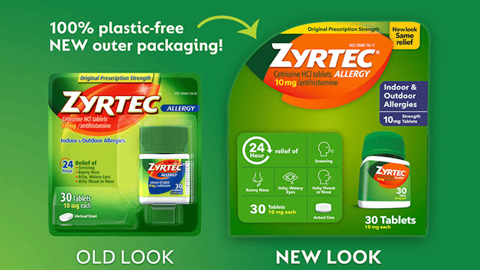A Little Cleaner, A Little Greener: Henkel Taps New Packaging Materials for Detergent Pods
Henkel is making progress on its sustainability targets thanks to a new packaging material for its detergent capsules.
The household goods, health and beauty company is reducing the amount of plastic used in its Persil 4in1 Discs by 40% by leveraging a new material combination from Greiner Packaging. The K3-F packaging employs a patented tear-off design — with a cardboard wrap and plastic container — so the materials can be separated and more easily recycled.
What’s more, cardboard with 92% recycled content is used to make the cardboard sleeve, and the plastic container now includes 50% of r-PP recycled material.
Beyond detergent pods, the packaging is suitable for powdered foods, as well as for tube-shaped packaging or pouches, such as those used for pet food.
It can also replace the coated cardboard solutions used in detergents or substitute for cardboard containers with additional plastic packaging, such as cereals.
Henkel, headquartered in Düsseldorf, Germany, has set a series of targets for sustainable packaging in order to promote a circular economy, including having 100% of its packaging recyclable or resuable by 2025. By the end of last year, it could make this claim for 85% of its packaging.
The company also aims to aims to reduce the amount of virgin plastics from fossil sources in its consumer products by 50% by 2025, which it intends to achieve by increasing the proportion of recycled plastic for its consumer goods products globally to more than 30%, by reducing plastic volume, and by increasingly using bio-based plastics.
“Packaging and plastic have captured the attention of the public, governments and businesses around the world more than ever — plastic waste ending in the environment is one of the greatest global challenges,” said Sylvie Nicol, executive vice president human resources at Henkel and chair of Henkel’s sustainability council, in a recent statement. “The search for solutions is well underway, and our packaging experts are working intensively to deliver on our ambitious targets. To drive further progress and promote a circular economy, we are working closely together with our partners along the entire value chain.”
Both Henkel and Greiner are signatories to The Ellen MacArthur Foundation’s New Plastics Economy Global Commitment, which aims to eliminate problematic or unnecessary plastic packaging; make packaging reusable, recyclable or compostable; and increase the use of recycled materials in packaging.
Henkel is No. 25 on the CGT Top 100 Consumer Goods Companies of 2019 list.






